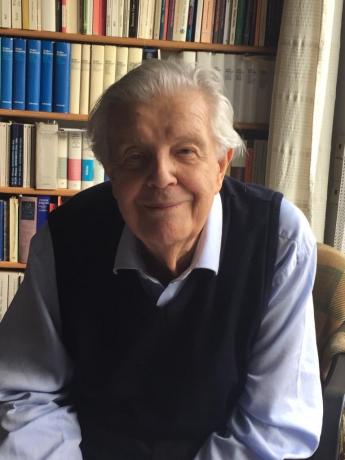Actualités
Herbert Blank (1929-2023). An obituary by Gunnar Gräff

Any attempts to present his numerous important catalogues as a literary and philological achievement were rejected by him. "It is not the personal or monetary success that is decisive, but always the passing of a book from one bibliophile to the next," he once told me. Blank understood his catalogues first and foremost as the products of a book collector striving to clarify literary and historical contexts. In this context, he produced internationally acclaimed catalogues such as "Gruppe 47" (1988), "Französische Revolution. Zustimmung und Abwehr in der deutschen Literatur" (1989), "Ernst Jünger" (1995), "Die Paulskirche: Bücher und Autographen von Abgeordneten der Frankfurter Nationalversammlung und einige Weggefährten" (1998), "Goethes Welt" (1999), "In Walter Benjamin's Library" (2006) and, last but not least, the perhaps best-known catalogue "Kafka's World" (2001), a reconstruction of Kafka's readings, based on his letters and works, which received well over 100 reviews all over the world and made Herbert Blank internationally famous.
Herbert Blank was born on 20 June 1929 in Nuremberg and grew up in modest circumstances. Raised by his grandmother in a house without books, he tried to escape the intellectual confinements of his home at an early age. In the summer of 1944, at the age of only 15, he arbitrarily quit the unloved school and looked for an apprenticeship in a print shop. Linotypes set up in air-raid shelters sparked in him a first enthusiasm for printing. Shortly after the end of the war, his grandmother had in the meantime moved with him from Nuremberg to southern Germany, he again packed his few belongings to find shelter with his fatherly friend Heinrich Wendel in Lorch. Wendel had been a set designer at the Nuremberg theatre, Blank, for his part, worked as an extra at the opera, dreamed of a career as an opera singer and was enthusiastic about the "artistic nature" of his new friend. Wendel was also the one who introduced Herbert Blank to anthroposophy. After a short apprenticeship in a bakery, Wendel placed him with the Stuttgart family of Erich von Houwald, whose three sons had been killed in the war. The years that followed at the Waldorf School in Haußmannstraße consolidated his sympathy for anthroposophy and his love of Goethe and classical literature.
After school - in the meantime he had long since begun to collect books - his interest in the book trade was awakened. At Koch, Neff & Oetinger he gained the business know-how for his own company later on and in the export department an essential insight into the international interconnections of the book trade, before he moved to the publishing house Freies Geistesleben, where he became managing director in 1956 and held the position for 10 years.
Following his decision to become an independent bookseller in 1965, his first catalogues still covered the whole world of the humanities. He then began to collect first editions of his childhood idol Johann Gottlieb Fichte (as a publisher, he himself published Fichte texts), before his later specialities, first editions of the Goethe period and literature of the 20th century, especially exile literature, gradually crystallised based on his own interests. From collector to bookseller - Herbert Blank shared this career path with many of his colleagues.
Herbert Blank embraced the rare book trade and devoted his entire life to it. His customers, who were scattered all over the world and with whom he often shared a personal friendship, appreciated the high standards he set for himself and his books, and valued his great expertise and high quality and authenticity of his books and descriptions in the over 50 catalogues he produced over the years.
Blank had a loyal clientele, especially at the Stuttgart Antiquarian Book Fair, where he continuously had a stand since 1971 and could always rely on them. Without them, the collections assembled over the years and the corresponding themed catalogues would not have been possible.
In his old age, he still devoted himself to what he once called his most important project, a "matter of the heart"; by completing a work started by his second wife Inge Thöns. Thöns, writer, editor at the Urachhaus publishing house and his congenial partner, had died in 2014 after a long illness. She owned the guest book of the Parisian exile bookshop "Librairie Au Pont de l`Europe", with numerous entries by well-known authors and people from cultural life. Blank completed the history of the bookshop, which she had already largely worked out, with short biographies of the persons entered. The book was published in 2018 by Wallstein Verlag Göttingen.
In the 1990s, together with Inge Thöns, he also organised literary salons at home, to which he invited well-known writers, some of whom were also friends. Hans Mayer, Hans Magnus Enzensberger, Hilde Domin, Arnold Stadler, Urs Widmer, Christoph Meckel, Herbert Heckmann, Siegfried Lenz, to name but a few, came. It was also Inge Thöns who had the job of "prompter" at the Stuttgart Fair, since Blank, as he once confessed to me, could not remember faces. In the early years, their holidays always took them to Saas Fee in the Swiss Alps, and later to Provence, which they both loved so much.
When I visited Herbert Blank a few days before his death, he was already walking with a conspicuous hunch. His shortness of breath, which had been plaguing him for several months, did not prevent him from talking. He talked about his books, about what he had read, what he still had planned to do and what would probably no longer be possible. He regretted the "fatigue that prevented him from working", but never complained about illness or infirmity.
When I was leaving, he told me the sentence that I had heard from him not for the first time: "I am grateful for everything".
This translation was done on the basis of the original obituary by Gunnar Gräff, published on the website of the Verband Deutscher Antiquare HERE
